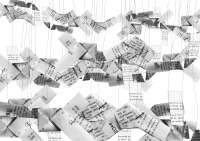Wish Tree
I am drawn to the naivety of the words “wish” and “tree”. In the current cultural atmosphere of criticality, the naive cliche of growing wishes on a tree feels almost refreshing. But then I question what kinds of wishes we can grow on this tree, and more fundamentally if we have anything that we can call a “wish”. Another cliche: we believe money can buy anything these days. Can a wish be a wish if it can possibly be realised via the system of buying and selling? Or perhaps we do not know how to have wishes anymore. As my cynical yet literal response to these questions, I contemplate the receipts we get for our cheap, conveniently sold, easily forgotten wishes that continuously allure us to the same cycle of purchasing and consuming. Our lives are filled with numerous, unmemorable wishes – as many as the monetary transactions that fill our days. In varied – yet always portable – sizes, each receipt is folded [picture 1] and hung [picture 2] from the ceiling, which represents an imaginary tree. The cheap ink on the receipts will slowly evaporate, and only the blank receipts will remain, oxidized with faint traces of the purchases made. Visitors are encouraged to bring their own receipts, and fold and hang them with transparent threads. The receipts fill the room like layered waves, in gradually changing lengths from the ceiling. Even though I am cynical about the capitalistic fulfillment of our everyday wishes, I also see tragedy in our daily rituals of consumerism. People march towards cashiers in a long queue to pay for their wishes, measured by the number of receipts, torn and crunched, being tossed into garbage cans or to the streets. The receipts whistle and agitate like a flock of birds, except they do not fly away to anywhere. They are forgotten in the stale air, like dust continuously landing on the surface of our skin.
Wish Tree
I am drawn to the naivety of the words “wish” and “tree”. In the current cultural atmosphere of criticality, the naive cliche of growing wishes on a tree feels almost refreshing. But then I question what kinds of wishes we can grow on this tree, and more fundamentally if we have anything that we can call a “wish”. Another cliche: we believe money can buy anything these days. Can a wish be a wish if it can possibly be realised via the system of buying and selling? Or perhaps we do not know how to have wishes anymore. As my cynical yet literal response to these questions, I contemplate the receipts we get for our cheap, conveniently sold, easily forgotten wishes that continuously allure us to the same cycle of purchasing and consuming. Our lives are filled with numerous, unmemorable wishes – as many as the monetary transactions that fill our days. In varied – yet always portable – sizes, each receipt is folded [picture 1] and hung [picture 2] from the ceiling, which represents an imaginary tree. The cheap ink on the receipts will slowly evaporate, and only the blank receipts will remain, oxidized with faint traces of the purchases made. Visitors are encouraged to bring their own receipts, and fold and hang them with transparent threads. The receipts fill the room like layered waves, in gradually changing lengths from the ceiling. Even though I am cynical about the capitalistic fulfillment of our everyday wishes, I also see tragedy in our daily rituals of consumerism. People march towards cashiers in a long queue to pay for their wishes, measured by the number of receipts, torn and crunched, being tossed into garbage cans or to the streets. The receipts whistle and agitate like a flock of birds, except they do not fly away to anywhere. They are forgotten in the stale air, like dust continuously landing on the surface of our skin.

